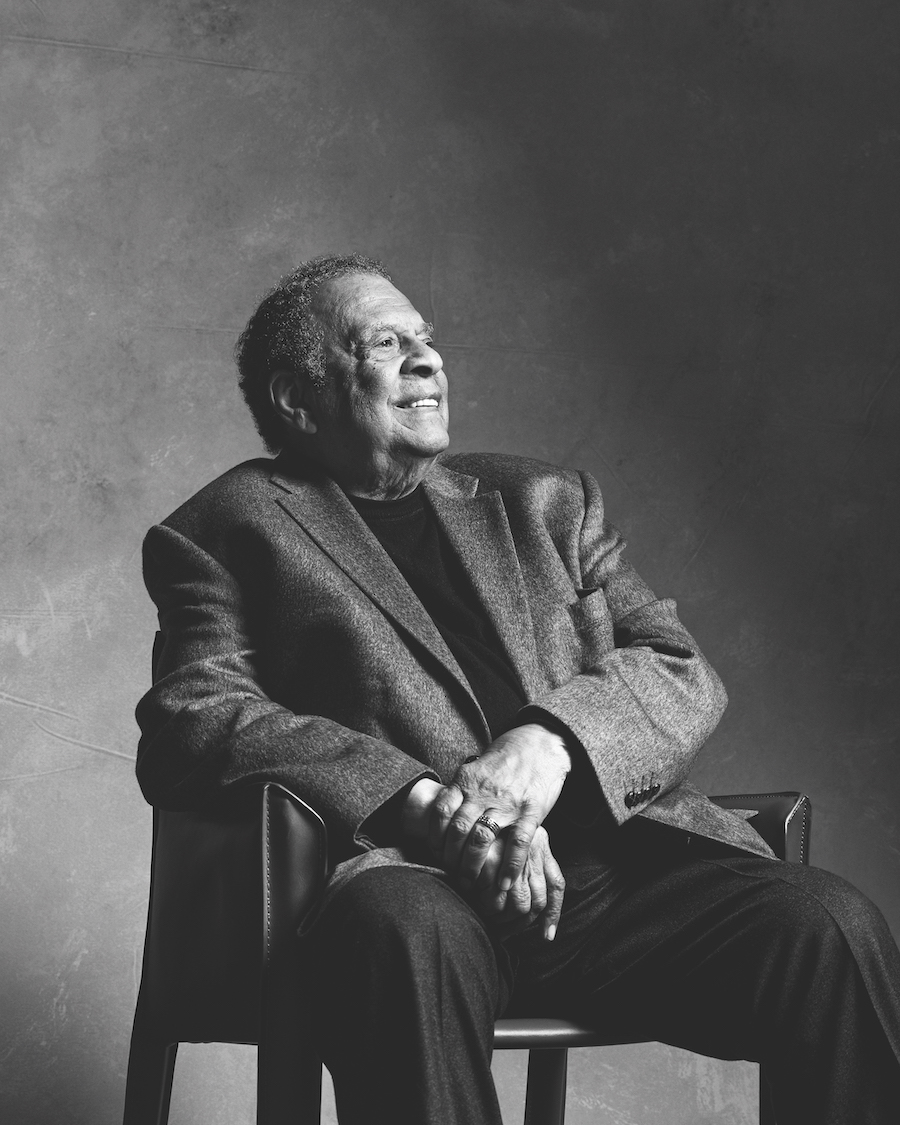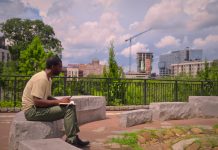One day, when we were all in our early 30s, Martin Luther King Jr. said to our little ragtag bunch, Everybody here has got to be clinically insane to think that with no money, no political power, no army, no nothing, we are going to redeem the soul of America. And then, he said, We’ll be lucky to make it to 40. But if we make it past 40, we’re going to have to make it to 100 because this is not an easy job. It’ll take more than our lifetimes to get it right. Well, I think that planted it in my mind, especially after he was killed, that I had to make it to 100.
I’ve taken care of myself. I never smoked, I never drank. I drank a little wine at the U.N. In Europe, it’s offensive not to drink wine, but I refused to drink vodka with the Russians whenever I could. I did the Bicycle Ride Across Georgia three or four times. And I could swim a mile in an hour. In fact, for my 75th birthday, I swam 75 lengths of the pool as a fundraiser for the YMCA. There’s so much I have learned. I’ve been surrounded by a lot of brilliant people: Martin Luther King Jr., Jimmy Carter, Nelson Mandela, Desmond Tutu.
I grew up in New Orleans, and that’s still a strong influence in my life. I came to Atlanta to help with the civil rights movement. King was trying to get it started almost on his own. I had been in New York, done a lot of international travel. Frankly, I had a pretty sophisticated background for somebody who was just turning 30. We had just bought a house in Queens. I had a good job, and my wife had just gotten her master’s from Queens College—for $16 a semester. I figured God had blessed us for [some purpose]. And she did, too. She wanted to come back South and get involved in the movement. So, that’s how I ended up coming to Atlanta.
The job that brought me back here was to teach people to read and write, to help them pass the literacy tests so they could register to vote. And to teach people how to organize their communities to be represented in the politics of their region.
The basis of democracy is the right to vote. And that’s what I’ve been doing ever since I’ve been back South to Atlanta. In the last meeting Martin Luther King Jr. had with Harry Belafonte, John Conyers of Michigan, Dick Hatcher of Gary, Indiana, and myself, he was talking about, How do we take the energy and vitality of the civil rights movement and move it into politics? That was the last order he gave me.
I got involved with Sam Massell and Jesse Hill. I met Ivan Allen. Well, I met the leaders of Atlanta, and I was impressed with them. Ivan Allen had a plan of improvement that included new expressways and MARTA, a new airport, bringing sports to Atlanta—all of which I was interested in. The way he and Dan Sweat [aide to Allen and longtime civic leader] spelled out the future of Atlanta, I was ready to buy in.
We won that mass-transit referendum in two counties, Fulton and DeKalb, but only by 400 votes. The Nixon administration had a lot of money set aside for transportation, and not a single other city in America voted for it. So, we were the only city that voted to get 90 cents from the federal government for every 10 cents we put in. Coca-Cola and IBM loaned executives, and the Woodruff Foundation chaired it, [headed by] Boisfeuillet Jones. He had cochairs of the mass-transit referendum; [they] were Daddy King and the head of the Ku Klux Klan. It was a clear message that the business community wanted to bring the city together and that they were ready to take on the race question.
I was trying to get everybody to run for Congress. I tried Vernon Jordan or Julian Bond. Nobody wanted to run. So, Harry Belafonte said, I guess you’ve got to run. And I said, No, not me! I’m the organizer. He said, Well, there’s nobody else.
When I started running, [the Fifth District] was only about a 31 percent Black district, and it included all of Fulton County. In my first congressional race, my opponents distributed probably 50,000 flyers with a very bad picture of me unshaven and in overalls. I think it was taken in Mississippi, where I was helping some elementary-school kids integrate a school. I was scowling because these kids had been beaten up the day before. The headline under it was “If Andrew Young is elected, the Black Panthers are going to get your daughter.” Nobody knew me, so I got clobbered . . . I didn’t know what I was doing. I was running because no one else would run.
We were having a lot of racial tensions, so Mayor Sam Massell asked me if I would be willing to serve as the cochair of the Community Relations Commission. The other cochair was Archbishop Donnellan of the Roman Catholic church. [There was also] Randy Taylor of the Presbyterian church, Bishop McKinley Young of the AME church, and [PR professional] Helen Bullard. Smartest woman I’ve ever known. She was the brains behind Atlanta. She was the one that was calling the shots, like [promoting the phrase] “the city too busy to hate.”
Mediating racial difficulties was all I had been doing for Martin Luther King. That was basically my vocation, what I’ve been doing all my life. There were five or six [major conflicts and strikes] that summer, but we settled them all in less than 10 days.
That’s where I got the reputation that let me win the next race for Congress against Rodney Cook [who served on the forerunner of the Atlanta City Council and as a state representative, recently becoming the namesake of Atlanta’s new park in Vine City]. He and I were good friends, and we got to be better friends running. My feeling was that anybody that I’m running against, we should be better friends when we got through than we were when we started. And that was true with Rodney—so much so that, [years later,] he asked his son to see if I would do the eulogy at his funeral. I’ve been a friend of their family ever since.
I got along with people in Congress. And when I ran for mayor, I knew my way around Washington, and I knew my way around the United Nations and the World Bank. I’d been to all of those international meetings. I think by the time I was elected, I’d been to more than 100 countries. Atlanta had been talking about becoming the next great international city, so I was exactly what the city needed at that time. It wasn’t any particular virtue of mine; it was the grace of God.
Atlanta was always international, but we just didn’t define it that way until the Olympics. Coca-Cola—Mr. Woodruff—made Atlanta international when he decided that any soldier in World War II should be able to get a Coca-Cola anywhere he served in the world. That was the decision that made Atlanta international. There was an Atlanta presence almost everywhere in the world. I used to bring back pictures of people painting Coca-Cola signs in Africa, decorated Coca-Cola bottles from Mongolia. There’s no place I’ve ever been where we couldn’t get a Coca-Cola.
Charlie Loudermilk was the only white businessman who supported me. The business community had decided that people wouldn’t invest in cities that had Black mayors. They were basing that on the decline of Newark, Detroit, and Cleveland. I said to Charlie, I think I can win, but it would really be bad for me to win with no white business support. Everybody knows you, everybody likes you. I need you to help me win. And, when I win, I’m going to need you to help me heal the divisions that might be created.
The first meeting he took me to was with the vice president of a bank. I spelled out this line about Atlanta becoming the next great international city. It was just not something that anybody could believe. I saw him lean over and ask Charlie something, and they both laughed. Later, I told Charlie that I needed to know what the guy said. He told me: “He just said, Charlie, where did you get that crazy nut from?” And I said, “He probably used an n-word, but it wasn’t nut.” We laughed, and we left it at that. The bank executive and I became very good friends, and we flew around the world.
I think we brought in $70 billion worth of direct foreign investment. And 1,100 companies moved here from abroad in eight years. Billy Payne challenged me to help him with the Olympics. When he made the presentation and I looked at the list of the votes, there were 85 votes. I had [contacts with] 55 of them.
We ran the Olympics with private money. We built the airport with private money. We don’t get our money from Washington; our money comes from Wall Street. We have put somewhere in the neighborhood of $23 [billion] to $25 billion into that airport, and none of it is taxpayer money. We’ve done that with the Olympics, and we’ve done that with the Mercedes-Benz dome.
And when I say Atlanta, I mean metropolitan Atlanta. We function as a metropolitan area, and we need to function as a state. And that’s why we need a state government that works with us because you can’t hold back Atlanta without holding back the whole state of Georgia.
I never had a quarrel with the state. A friend of mine was a good friend of the speaker [of the House of Representatives], and the speaker’s wife died right after I was elected. In fact, I was elected on Tuesday, and the speaker’s wife’s funeral was that Saturday. My friend woke me up and said, Get up! We’ve got to go to Bremen. And I said, I don’t know anybody in Bremen. He said, Yeah, but they know you. You’re the mayor of Atlanta. I said, No, I don’t become mayor of Atlanta until January. He said, No, you got elected.
So, we went over to the funeral. I was nervous when we went in. The speaker got up from the mourner’s bench. Without saying anything, he took me by my hand and led me down the aisle. The family was on one side, and all of the politicians of Georgia were on the other side. He stood me in front of Herman Talmadge and Lester Maddox and said, You all push over and make room for the mayor of Atlanta. Not only did that get me a seat, but it showed the governor and the senator that I was all right with the speaker.
We [can] do with the Port of Savannah what we did with the airport. It sounds crazy, but I’ve talked to some of the biggest port authorities and developers in the world [about] the plans we’ve been dreaming about. The same quality of rock that we bored through with MARTA goes 300 miles out to sea. We can build a port 20 miles offshore that will serve everything from Jacksonville to North Carolina. That will make Georgia and Atlanta the fastest-growing economy in the world.
I came to Atlanta before it started growing, so I grew with Atlanta. I made a contribution to Atlanta, but Atlanta made one hell of a contribution to me. Everything except money. I still live in the same house that I paid $32,000 for in 1966. I was fortunate enough to marry two schoolteachers, so their health insurance from Atlanta Public Schools has kept me safe.
There isn’t a lot I’d want to change. I was 30 when I came here. So, that’s 60 years, and I don’t believe I’ve had a bad day.
This article appears in our March 2022 issue.









![The North Carolina Museum of Natural Sciences’ newest exhibit is a [pre]historic first](https://cdn2.atlantamagazine.com/wp-content/uploads/sites/4/2024/04/DD-3-100x70.jpg)




